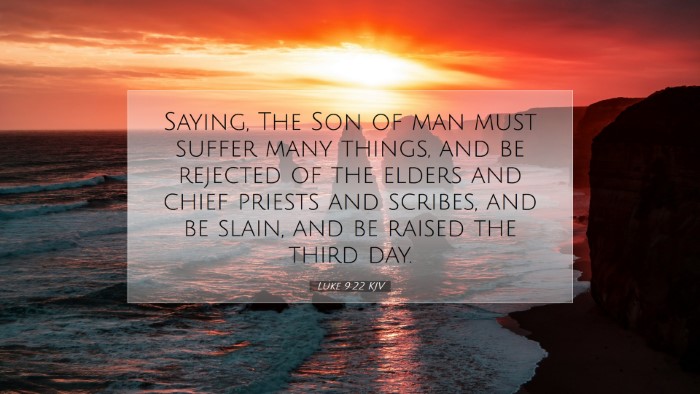Commentary on Luke 9:22
The words of Jesus in Luke 9:22, "The Son of Man must suffer many things, and be rejected of the elders and chief priests and scribes, and be slain, and be raised the third day," present a profound insight into the redemptive purpose of Christ. This verse serves as a critical juncture in the Gospel narrative, revealing the necessity of Christ's suffering, rejection, death, and resurrection. The commentaries from Matthew Henry, Albert Barnes, and Adam Clarke provide valuable theological and practical insights that resonate deeply with pastors, students, theologians, and Bible scholars.
Exegesis and Context
Firstly, it is essential to consider the context of this verse. Prior to this declaration, Jesus had just asked His disciples about His identity, where Peter confessed Him as the Christ of God (Luke 9:20). Following this revelation, Jesus responds with a directive not to tell anyone about Him and immediately discusses His impending suffering. This sequence underscores the transition between the recognition of Jesus as the Messiah and the understanding of His messianic mission involving suffering and sacrifice.
The Necessity of Suffering
Matthew Henry emphasizes that the phrase "must suffer many things" signifies the divine necessity of Christ's suffering. This suffering is not arbitrary but rooted in the purpose of God for humanity's redemption. Henry notes that the necessity indicates that the plan of salvation was foreordained and that Christ willingly submitted to this path for the sake of fulfilling Scripture and the will of the Father.
Albert Barnes echoes this sentiment by highlighting the prophetic nature of Jesus' mission. He points out that the rejection by the religious leaders—the "elders, chief priests, and scribes"—was foretold in the Old Testament, significantly painting the picture of the ultimate rejection of the true Messiah by those who claimed to represent God. This points to a larger theme of the danger of institutional religion becoming an adversary to divine truth.
Rejection and Death
The rejection faced by Jesus is a critical theme that requires deep theological reflection. According to Adam Clarke, the rejection Christ faced is indicative of the moral condition of humanity. Rather than embracing Him, He was cast aside by those who should have been the first to recognize Him. Clarke elaborates that this serves as a warning to believers and the church to remain vigilant against the subtleties of pride and self-righteousness that prevent the reception of God's truth.
The Resurrection
The declaration that He "shall be raised the third day" encapsulates the hope of the gospel. Henry articulates that this aspect of the prophecy not only provides assurance of victory over death but also demonstrates the power and authority of Christ as the conqueror of sin and the grave. It is a pivotal moment that assures believers of the fulfillment of God's promises.
Power of the Resurrection
- Victory Over Death: The resurrection is presented as the ultimate triumph over death, a theme that reverberates throughout the New Testament (1 Corinthians 15:55).
- Fulfillment of Prophecy: This underscores the prophetic nature of Scripture, affirming that God's plan unfolds precisely as foretold.
- Hope for Believers: The resurrection offers believers assurance of their own resurrection and eternal life.
Theological Implications
Luke 9:22 challenges the reader to grapple with the implications of Jesus' journey. Matthew Henry encourages believers to acknowledge the profound love of Christ, evidenced in His willingness to endure suffering for others' salvation. This call for selflessness is mirrored in the lives of Christians who are called to take up their cross daily (Luke 9:23). The path of suffering may lead to growth, redemption, and deeper fellowship with Christ.
Albert Barnes offers a reminder that while the path includes suffering, it is equally filled with the assurance of future glory, encouraging believers to remain steadfast in faith despite trials. He posits that understanding the inevitability of suffering helps Christians to navigate their own trials with grace and expectant hope.
Application for Today’s Believers
The insights from these commentators present a multi-faceted approach to understanding Luke 9:22. For pastors and theologians, the importance of preaching Christ’s suffering, rejection, and resurrection cannot be overstated; these themes are foundational to the Christian faith.
- Understanding Suffering: Embrace the reality of Christian suffering as a reflection of Christ’s experience.
- Rejecting False Narratives: Be vigilant against teachings that diminish Christ’s sacrifice or reject the necessity of repentance and faith.
- Anticipating Resurrection: Hold fast to the message of hope found in Christ’s resurrection, which transforms the believer's perspective on life and death.
Conclusion
In conclusion, Luke 9:22 serves as a vital text that encapsulates the essence of the Christian gospel. The synthesis of insights from Matthew Henry, Albert Barnes, and Adam Clarke provides a reservoir of theological depth and practical application. Christ’s commitment to the cross and His subsequent victory brings profound meaning to the believer’s journey. As ministers, scholars, and followers of Christ engage with this text, let it stir them to a deeper understanding of the cost and glory of the gospel they embrace.


